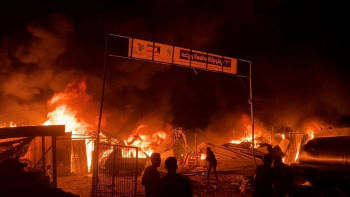We are all biomass

In a recent commentary, philosopher Michael Marder looks beyond the immediate horror of what is taking place in Gaza to consider the ontological implications of what we see in the long-distance drone shots of the ruins. Allow me to quote him at length:
"… Gaza is rapidly transformed into a dump, where high-rise buildings and human bodies, ecosystems … and orchards are mutilated beyond recognition and reduced to organic-inorganic rubble. A solidarity with dumpified lives, places, and worlds requires something other than compassion. So what could that be?"
Marder's answer is to propose "another kind of solidarity based on the shared condition of biomass." To say, "I am biomass" is to "identify with a vanishing life," to see Gaza as "a condensed and particularly blunt version of a planetary tendency." The rendering of all life into mere biomass—chaotic heaps of organic and inorganic matter—can be found everywhere, but it has been "accelerated in Gaza at the cutting edge of the most recent technologies of devastation. Rather than compassion, then, what is required is the solidarity of the dumped, who dare assert, 'We are biomass.'"
This notion of biomass echoes an insight from philosopher Levi Bryant, "In an age where we are faced with the looming threat of monumental climate change, it is irresponsible to draw our distinctions in such a way as to exclude nonhuman actors." And yet, in today's capitalist societies, efforts to mobilise a large majority of people in the name of our shared ecological condition consistently fail. We all know that we are part of nature and fully dependent on it for our survival, yet this recognition does not translate into action. The problem is that our choices and outlook are influenced by many other forces, such as biased media reporting, economic pressures on workers, material limitations, and so forth.
In her 2010 book Vibrant Matter, philosopher Jane Bennett has us picture a polluted trash site, where not only humans but also rotting trash, worms, insects, abandoned machines, chemical poisons, and so on each play some active role. This scene of biomass exists on the same spectrum as the situation in Gaza, though the latter is an extreme case. Around the world, there are numerous large physical spaces, especially outside the developed West, where "digital waste" is dumped, and thousands work separating glass, metals, plastic, mobile phones, and other man-made materials from the chaotic heaps. One such slum, Agbogbloshie, near the centre of Accra (the capital of Ghana), is known as "Sodom and Gomorrah."
Life in these environments is a horror show, and the communities that live in them are strictly hierarchically organised, with children forced to do the most dangerous work, under extremely hazardous conditions. Yet, because this exploitation of biomass appears ecologically attractive (under the banner of "recycling"), it responds perfectly to the demands of modern technology: "In the technological age," writes philosopher Mark Wrathall, "what matters to us most is getting the 'greatest possible use' out of everything."
After all, the whole point of using resources sparingly, of recycling, and so forth is to maximise the use of everything. The ultimate products of capitalism are piles of trash—useless computers, cars, TVs, VCRs, and the hundreds of planes that have found a final "resting place" in the Mojave Desert. The idea of total recycling (in which every remainder is used again) is the ultimate capitalist dream, even—or especially—when it is presented as a means of retaining Earth's natural balance. It is yet another testament to capitalism's capacity to appropriate ideologies that seem to oppose it.
However, what makes the exploitation of biomass different from the capitalist logic is that it accepts a chaotic wasteland as our basic predicament. Though this condition can be partly exploited, it can never be abolished. As Marder puts it, biomass is our new home; we are biomass. It is a fantasy to think that such environments can be left behind and replaced by life in some idyllic "natural," ecologically sustainable environment. That easy way out has been irretrievably lost to us. We should accept our only home and work within its confines, perhaps discovering a new harmony beneath what appears to be a chaotic heap.
This will require us to be open to the objective beauty of different levels of reality (humans, animals, ruins, decaying buildings), and to reject a hierarchic ordering of aesthetic experiences. Are we ready to do this? If not, we are truly lost.
Slavoj Žižek, professor of philosophy at the European Graduate School, is international director of the Birkbeck Institute for the Humanities at the University of London.
Copyright: Project Syndicate, 2024
www.project-syndicate.org
Views expressed in this article are the author's own.
Follow The Daily Star Opinion on Facebook for the latest opinions, commentaries and analyses by experts and professionals. To contribute your article or letter to The Daily Star Opinion, see our guidelines for submission.

 For all latest news, follow The Daily Star's Google News channel.
For all latest news, follow The Daily Star's Google News channel. 










Comments